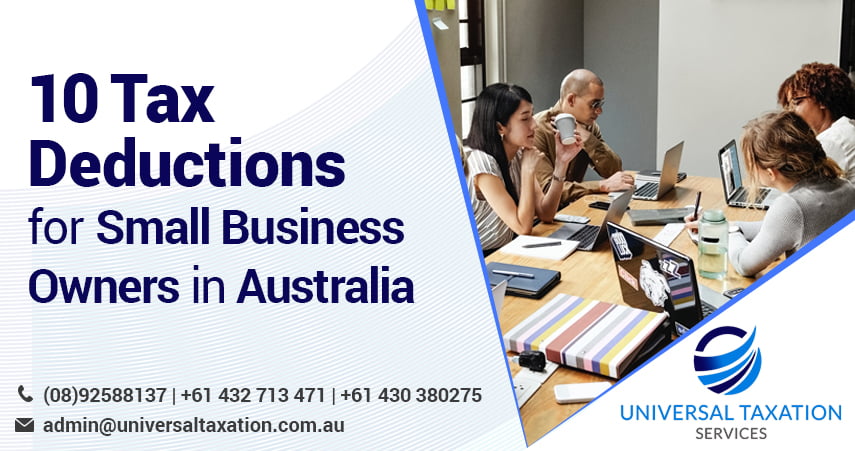
9 Things to Claim on Tax as an Australian Self-Employed
June 25, 2019
9 Tips to Deal with Financial Stress
July 25, 2019Small business owners often fall into the trap of shelling out extra tax during tax time, without paying heed to some less obvious ATO tax deductions available.
It is important to find a tax accountant so that he/she would be able to guide you appropriately on filling the tax returns precisely and competently.
Is your business lagging during tax time? Here are some potential tax deductions that you need to consider when submitting tax returns yourself.
What Can You Claim on Tax?
Let us take a look at some of the points which would help you in claiming tax for your small business:
- Promotion & Advertising: One can claim deductions for costs involved in branding and publicity for your business, including any advertising or sponsorship that is involved in selling ‘trading stock’ and also in the process to hire company staff. Ensure that costs incurred are not indicative of any costs involved in ‘entertainment’, since they are not usually deductible.
- Work Related Expenses: Business owners who are using their personal car for business tasks or work-related reasons, apart from going to and fro from work, can claim tax deductions on fuel and maintenance costs. They should be car owners though and should travel during the working day.These scenarios come under the purview – driving between multiple company offices, special trips to meet clients, or going to the bank or transport used for going from one job site to another.
- Running Business Right from Home: If you are managing a home-based business, or have a small home office that allows you to work from home, you can claim:
- Occupancy expenses – mortgage interest or office rent, land taxes, insurance premiums
- Running expenses – gas, phone, electricity, depreciation in plant and equipment, depreciation cost of furniture.
One can rely on ATO’s Home office expenses calculator to work out tax deductions for home office expenses.
- Take Advantage of the $20,000 Instant Asset Tax Break: This is the Australian Taxation Office’s breakthrough that will benefit multiple small businesses a lot. The Australian Government introduced this amendment in the year 2015’s Federal Budget. The law states that an instant subtraction on assets that generate income up to $20,000.
There are those who take the step of an instant write-off for a select number of years. With this measure, you would be able to claim these deductions for many vital assets for the company. This might include setting up the equipment, computer workstations, vehicles, etc that are lower than $20,000. The estimated deadline that the ATO has set for this is primarily 30th June 2018.
- Salary and Wages: You can claim deductions for all salaries paid to employees in respect of duties connected with your business. Partnerships through can’t claim for all salaries paid to partners. Sole traders also can’t claim deductions for salary paid to themselves and even for money used for private purposes.
- Telephones: This point refers to the fact about the use of mobile phones, or satellite office phone expenses for official purpose. This would come under the ambit of the Australian Taxation Office, and you would be able to claim a sufficient amount of tax deductions from it. There are two essential points in it over which you would be able to claim the deduction, these are:
- If you have paid off the operators for the telephone costs.
- If you have a sufficient amount of records to support your claims.
The Taxation department only evaluates these points concerning work-related purposes. So, if you are using these telephones as personal and private ones, then you need to give them the percentage of use for work.
- Business Travel: Business Travels also come under the purview of being tax deductible under the laws laid down by the ATO. Some of the deductions on travel that are applicable for you as an owner or for your employees include the following:
- Air Travel, train tickets, bus, and taxi travel fares.
- Any kinds of housing arrangement costs, food expenses if you are traveling throughout the day for a business trip.
In the above case, something called the fringe benefits tax would be applicable for bearing the travel expenses of the employees.
Some points that need to be kept in mind and communicated to the tax officials while submitting travel records include,
- What is the nature of travel?
- For how many days was the business trip scheduled?
- How long did the overall trip last?
- The name of the business house with which you carried out your business.
- Car Expenses Deduction:You could claim full deductions on any expenses devoted to running a leased or owned vehicle if it was used for business purposes. If the business is a partnership, one can claim a part of deductions for vehicle expenses, based on substantiation rules.
- Repairs and Maintenance: Small business houses will also be able to claim tax deductions on the count of repairs and maintenance for the company assets. Some of them include,
- Painting the office premises.
- Conditioning gutters
- Maintenance of pipes for plumbing
- Maintenance of electrical equipment
- Any kinds of machine servicing if any.
Why You Cannot Claim on Tax?
Some of the important things which do come under the ambit of small business for tax purposes are,
- Domestic and private expenditures.
- Entertainment based costings.
- Penalties
- GST credit deductions if you are taking it separately on the Company’s activity statement.
Take Advice for your Tax Pay (Universal Taxation):
You can take official to advise for paying up your tax, and get to know what can and cannot be exempted from the same. There are regulations that you might not know, and there is a need that you understand some nuances on it; which is why it is essential that you get advised pronto.
Conclusion:
Small Businesses get a lot of leeway when it comes to certain points while filing their tax returns. But the biggest disadvantage for them could be the lack of knowledge about what is exempt and what is not. This is the reason that it is pressing to understand all the points that are mentioned above and some more after you have consulted with your accountant.
Having the right information is better than having no information at all.


